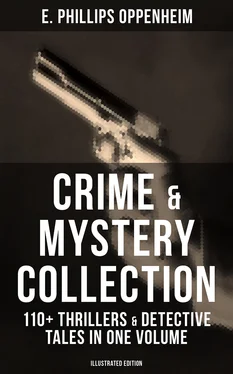“Your fortune teller was indiscreet,” the man of the caravan remarked, smiling.
“Bloody old witch!” the farmer muttered.
“Alas,” she went on, “the mischief was done when first she opened her mouth. My husband believed her. Since then he has lived in terror of the day when the prophecy should come true. That, sir,” she concluded, “is the cause of his inhospitality, though why he should take you for a gipsy, except that you have the dark hair and skin, and the caravan of a pedlar, I cannot say. Are you a gipsy, Mr. Pedlar?” she demanded, with an insolent little toss of the head.
Once more the eyes of the two met across the road, and this time the farmer’s grip of his riding crop tightened.
“Madame,” the man replied courteously, “if I am a pedlar, see my wares.”
He unfastened one side of the yellow travelling van, disclosing the interior. There was not a single article of merchandise visible of any sort—a neatly rolled-up little bunk, one or two water colours and prints upon the walls, bookcases filled to overflowing, a small stove and a cupboard full of crockery. The farmer drew a step nearer and looked in, frowning. The woman boldly leaned head and shoulders through the open space.
“It is a very pleasant home,” she murmured. “I take back my words, sir. I do not believe that you are a pedlar.”
The air of strain seemed to have departed. The farmer stood sheepishly in the road. The owner of the caravan tapped a cigarette against one of the wheels and lit it. Goade, who was quick to notice such things, realised that the tobacco was of choice quality.
“The fact of it is,” the stranger confided, “that I don’t know how to peddle, or perhaps I might. My efforts at making a living—a very necessary thing to me, for I am a poor man—are confined to a little—well, I will dignify it and call it literary work. It was in my attempt to conclude a short article on this part of the country that I forgot to watch where I was going, and allowed this patient but unenterprising beast of mine to shy at a cockerel and place me in this unfortunate predicament.”
“I think the best thing we can all do,” Goade suggested to the farmer, “is to help him get clear. His wheel is sinking lower every moment.”
“If he’d said at first that he wurn’t no gipsy,” the farmer grumbled, “there’d have been naught of any disturbance. No gipsy will I have around the place, or on my land, which is well known, and them as calls my wife a gipsy lies. She’s naught to do with them, or of them. She’s my properly wedded wife, as all should know who live in these parts, and, if she were gipsy-born afore, she be naught now but a proper Devon woman. Come on Bill there, and you, John! Put your shoulders to it.”
The united efforts of the little company, aided by the horse, succeeded in bringing the caravan into the middle of the road. The farmer glanced towards Goade.
“You’d best turn in at my gate for a minute,” he advised. “It’s a narrow part here, narrow even for one wagon with a team. You can drive round the front of the house and out’en the gate top end of meadow, and you’ll be ahead of him. If you don’t do that you won’t be able to pass for a matter of three miles.”
“The farmer’s advice is good,” the owner of the caravan agreed. “I am a slow traveller. I find it restful.”
The incident appeared to be at an end. The labourers trooped off. The farmer stepped back and opened the gate for Goade.
“What do you think on ‘im?” he asked confidentially. “He has the quality speech, but he be as much like a gipsy as any I ever seed.”
“It is clear,” Goade replied, “that he is a person of education. I think I shouldn’t worry any more about him.”
Goade drove through the farmyard and round the front of the prosperous-looking house. The woman stood by the other gate. She opened it for him, and as he drew near she laughed up into his face.
“Give me your little white dog,” she begged. “I need company here.”
Goade shook his head.
“I couldn’t part with her,” he said, “I should be too lonely.”
“Lonely!” she replied, lingering a little over the word. “No man ever knows what loneliness really is.”
He passed through the gate, raised his hat, and waved his hand to the owner of the caravan who was seated, ready to start. At the top of the long ascent, Goade found the water in his radiator boiling and stopped for a moment. He looked backwards. Only the woman remained, leaning against the gate in almost the same attitude as when he had seen her first, except that her head was turned in his direction. Somewhere between him and her the caravan was slowly mounting the hill.
An hour or so later, Goade was eating bacon and eggs and drinking beer in the small coffee room of the King’s Arms at Dunstowe, when he was attracted by the resounding echo of heavy hoofs passing underneath the arched entrance outside into the inn yard. He glanced up. It was the caravan with its owner upon the box seat. A few minutes later the latter strolled in and greeted Goade pleasantly.
“Like the tortoise,” he announced, ringing the bell, “I have arrived.”
“Are you spending the night here?” Goade enquired.
The newcomer ordered a double glass of sherry and some supper from the girl who had answered his summons. Then he turned back towards Goade.
“I am not sure,” he answered. “Perhaps I may hire another horse and drive through the night. And yet,” he went on, after a moment’s pause, “I know I shall do nothing of the sort.”
He threw himself into an easy-chair with an air of complete exhaustion. There were faint purple lines under his eyes. He had the appearance of a man who had taxed his strength to the uttermost.
“You look as though you had been walking up these hills,” Goade remarked sympathetically.
“I don’t remember what I have been doing,” the other confessed. “I only know that I am here and that it has seemed a very long distance.”
“How far are you going?”
The owner of the caravan shook his head.
“I never know,” he answered. “When I start I go on. If the humour seizes me I shall travel to Land’s End, or again, the day after to-morrow I may feel like Piccadilly. To-night I have rather the fancy that there are unexplored lands in front of me.”
“I should sleep here to-night and have a rest if I were you,” Goade advised. “You’ll find everything very comfortable. By the by, my name is Goade—Nicholas Goade. What might yours be?”
“I am Mr. X,” the stranger announced. “I sign my articles—some of which you may have read—just ‘X.’ I enter my name in the hotel books—it excites curiosity—as ‘Mr. X.’ The licence for my caravan, alas, requires a larger amount of confidence on my part. I must confess that you will find inscribed upon my cards the name of Lauriston—Spencer Lauriston—a harmless name, I think. Certainly not of gipsy origin.”
Goade smiled.
“You’re still thinking of our ridiculous farmer friend,” he observed.
“Was he ridiculous?” the man reflected. “I don’t know. He may have been right. My grandmother was a Spaniard and there were stories about her—one never knows. Parts of oneself may sleep for years and be suddenly awakened. Perhaps, after all, Mr. Goade, the farmer was right. Perhaps I am a gipsy.”
“Your education—” Goade began.
“True,” the other interrupted. “I was at Winchester and Balliol. Yet, after all, there was that Spanish grandmother.”
They brought him the sherry. He drank it eagerly, and watched the girl lay a place for his supper.
“A curious little comedy that into which we both stumbled,” he continued, leaning back with his hands clasped behind his head. “A scene for a painter almost; the woman so terribly unusual, with her flaming colour, her air of disdain, the farmer—the old fool!—who had drunk the wine of witchery and married the strange woman. I wonder what the end of it will be?”
Читать дальше












